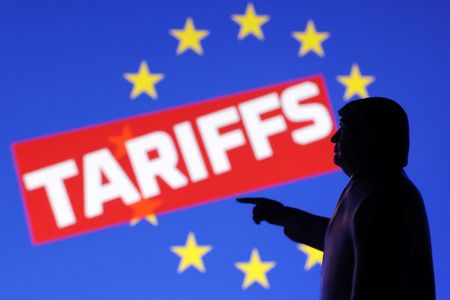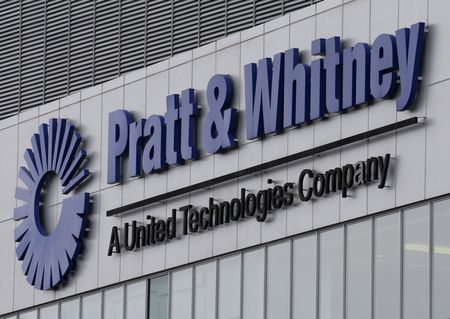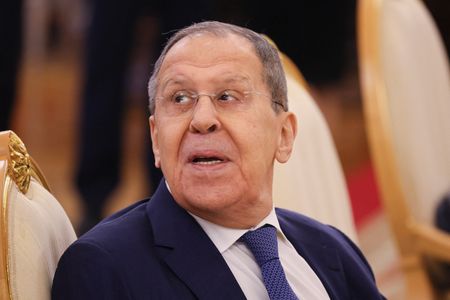By Philip Blenkinsop
BRUSSELS (Reuters) -The European Commission urged the U.S. on Friday to bring respect, not threats, to trade talks after President Donald Trump pushed for a 50% tariff on EU goods.
Insisting the European Union was committed to securing a deal that worked for both sides, EU trade chief Maros Sefcovic spoke with U.S. Trade Representative Jamieson Greer and U.S. Commerce Secretary Howard Lutnick. Trump had recommended higher tariffs on the EU from June 1.
The European Commission, which oversees trade policy for the 27-nation bloc, remained ready to work in good faith, Sefcovic said.
“EU-U.S. trade is unmatched & must be guided by mutual respect, not threats. We stand ready to defend our interests,” he wrote in a post on X.
Major stock indices tumbled, the dollar fell against major currencies and the euro pared gains after Trump’s announcement on EU tariffs and a potential 25% duty on Apple iPhones manufactured outside the U.S.
“With Trump, you never know, but this would be a major escalation,” said Holger Schmieding, chief economist at Berenberg. “The EU would have to react and it is something that would really hurt the U.S. and European economy.”
The tariff threat comes as talks are stuck, with Washington demanding unilateral concessions from Brussels to open up to U.S. business while the EU seeks an agreement in which both sides could gain, according to people familiar with the talks.
EU leaders and ministers that spoke after Trump’s announcement broadly backed the European Commission’s approach.
Polish deputy economy minister Michal Baranowski, whose country holds the rotating EU presidency, said the tariff threat appeared to be a negotiating ploy.
“The European Union and the United States are negotiating,” he told reporters on the sidelines of a meeting in Brussels, adding negotiations could last until early July.
“The fact that we see some important statements in the public domain does not mean that they will translate into actions of the U.S. administration,” he said.
Dutch Prime Minister Dick Schoof said the EU would stick to the path it had chosen.
“We have seen that tariffs can go up and down in talks with the U.S,” he told reporters in The Hague.
The EU already faces 25% U.S. import tariffs on its steel, aluminium and cars and so-called “reciprocal” tariffs of 10% for almost all other goods, a levy that was due to rise to 20% after Trump’s 90-day pause expires on July 8.
French Trade Minister Laurent Saint-Martin said Trump’s new threats did nothing to help negotiations.
“We are maintaining the same line: de-escalation, but we are ready to respond,” he wrote on X.
Italian Foreign Minister Antonio Tajani told Italian news agency ANSA that the aim remained “zero-for-zero tariffs”.
DIFFERING WISH-LISTS
In the past week, Washington has sent Brussels a list of demands to reduce the U.S. goods trade deficit, including so-called non-tariff barriers, such as by adopting U.S. food safety standards and removing national digital services taxes, according to people familiar with the paper.
The EU response has been to offer a mutually beneficial deal that could include both sides moving to zero tariffs on industrial goods, the EU potentially buying more liquefied natural gas and soybeans and cooperation on issues such as steel overcapacity, which both sides blame on China.
The Sefcovic-U.S. call was planned as a follow-up to these exchanges and ahead of a possible early June meeting in Paris.
Robert Sockin, senior global economist at Citigroup, said he believed Trump was seeking to bring the EU to the table.
“With a 50% tariff, there would be a recessionary forecast for Europe, but I am doubtful it would be enacted,” he said.
Washington says the tariffs are designed to redress the U.S. deficit in goods trade with the European Union, which was almost 200 billion euros ($226.48 billion) last year, according to EU statistics agency Eurostat. But the United States does have a large trade surplus with the EU in services.
The European Commission has repeatedly said it preferred a negotiated solution, but is ready to wield countermeasures if negotiations fail.
The bloc put in place, but then suspended, duties on 21 billion euros of annual U.S. imports in response to the U.S. metals tariffs and has compiled a list of 95 billion euros of U.S. goods as countermeasures to the U.S. ‘reciprocal’ and car tariffs.
($1 = 0.8831 euros)
(Reporting by Philip Blenkinsop, Jan Strupczewski and Bart Meijer, Leigh Thomas in Paris; Editing by Toby Chopra and Susan Fenton)











